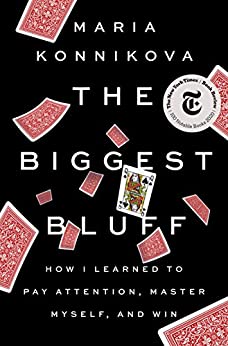The Biggest Bluff by Maria Konnikova – Book review

Maria Konnikova is American-Russian psychologist and a writer. She is a Ph.D. in psychology from Columbia University and in her 3rd book ‘The Biggest Bluff’ she describes her project/experiment in which she entered the Poker world with the goal to compete in the World Series Of Poker tournament.
I’m not a big Poker fan, but this book is very interesting from the perspective of learning. Maria did not have any Poker playing skills prior to starting the project and in her book she describes the way for going from newbie to the winner of one of the Poker tournaments.
Although she didn’t play poker, she had some advantage at the beginning of the project. She is a Phd in psychology and this could give her an advantage at the poker table. Unlike any other player, she could psychologically analyze her opponents and read them like a book to check if they are bluffing or not. At least this is what she was thinking at the beginning.
Poker as life in miniature
Maria chose Poker as this game simulates life. She chose the Texas hold’em variant of this game, because there is a proper mixture of chance and skill involved. There is chance, but not everything depends on it. Conversely, in chess there is no luck factor. The rules are clear and every player has the same chances for success at the beginning. Maria assumed that the skills she will learn by playing Poker could be directly transferable to life. And she wanted to learn how to deal with chance in life and maintain the feeling of control.
To accomplish what she planned, though, she needed a mentor. She convinced Erik Seidel, a professional Poker player and one of the best players in the world, to teach and guide her on this journey. As she didn’t have the experience in playing card games, having a mentor should significantly increase the learning process. Erik set up the learning milestones that needed to be achieved along the way.
Poker is all about decisions, and Maria tries to show fallacies and biases of human decision-making process. The planning fallacy for example is a tendency to be optimistic while making plans. We forget or omit all the problems or obstacles that can occur. When we should consider only statistics and probabilities, our emotions often take over and imbue our decisions. For example, a person who has suffered from a flood is more likely to buy a flood insurance even though her new home is in an area that is statistically unlikely to be flooded. What’s remarkable is that when we are aware of biases, it doesn’t prevent us from making biased decisions.
Status quo fallacy
Advice from Erik Seidel- less certainty, more inquiry. This is questioning a status quo and checking internalized beliefs. It is hard, but it’s the basis of self-awareness and helps build self-discipline. Erik did not share with Maria any wonderful method which allowed him to be a winning player over a longer period. Instead, he shared the tools and thought processes that allowed him to keep winning. This always-adjusting attitude keeps his mind open and focused, but moreover it is the reason for constant growth.
Another golden advice on how to thrive in an unpredictable environment is to keep a deliberate decision-making process. Before every decision, there needs to be a justification. Even if you lose because of bad luck, you can always say that your decision-making process was correct. If you act on a hunch, without thinking through, you will never know what and how to improve.
“If you want to grow, if you want to progress, you need to always dig deeper” – Maria Konnikova
